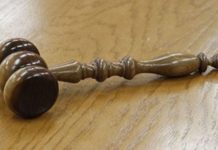
WASHINGTON, April 29 (UPI) — The Supreme Court rejected an emergency appeal on Friday to block Texas’ controversial voter ID law ahead of the November election.
But justices are prepared to revisit the issue before America goes to the polls this fall to select a new president.
Civil rights groups and the Obama administration have been fighting Texas SB 14, the strictest voter ID law in the nation, since it was passed in May 2011.
Opponents say that it could disenfranchise 600,000 voters who lack necessary identification, and that Texas has made it too difficult for those to acquire it. A disproportionate number of people currently unable to vote are poor Hispanic and black voters.
Before 2011, Texas required voters to show identification. But the bill signed by Republican Gov. Rick Perry restricted the kind of ID accepted, leading to charges that it was aimed at making it harder for specific groups of voters. For example, while permits to carry concealed handguns are currently deemed acceptable identification, college IDs are not.
A federal appeals court will hold a hearing to consider the law on May 24, and the Supreme Court is pushing for a quick decision so that it can revisit the case later this year.
“The court recognizes the time constraints the parties confront in light of the scheduled elections in November, 2016,” the Supreme Court’s order said. “If, on or before July 20, 2016, the Court of Appeals has neither issued an opinion on the merits of the case nor issued an order vacating or modifying the current stay order, an aggrieved party may seek interim relief from this court by filing an appropriate application.”
The law’s opponents welcomed the news, even though it didn’t give them everything they sought. “We’re very encouraged that the U.S. Supreme Court recognizes the time constraints involved in this case,” said Gerry Hebert, executive director of the Campaign Legal Center.
It was the second time the high court had refused to block the controversial photo ID law. In October 2014, the justices allowed Texas to enforce it ahead of November elections.
But there were strong dissents from Justices Ruth Bader Ginsburg, Sonia Sotomayor and Elena Kagan. Ginsburg stayed up all night to write a blistering dissent that was issued pre-dawn on the weekend before early voting began in Texas.
“The greatest threat to public confidence in elections . . . is the prospect of enforcing a purposefully discriminatory law, one that likely imposes an unconstitutional poll tax and risks denying the right to vote to hundreds of thousands of eligible voters,” Ginsburg wrote at the time.






